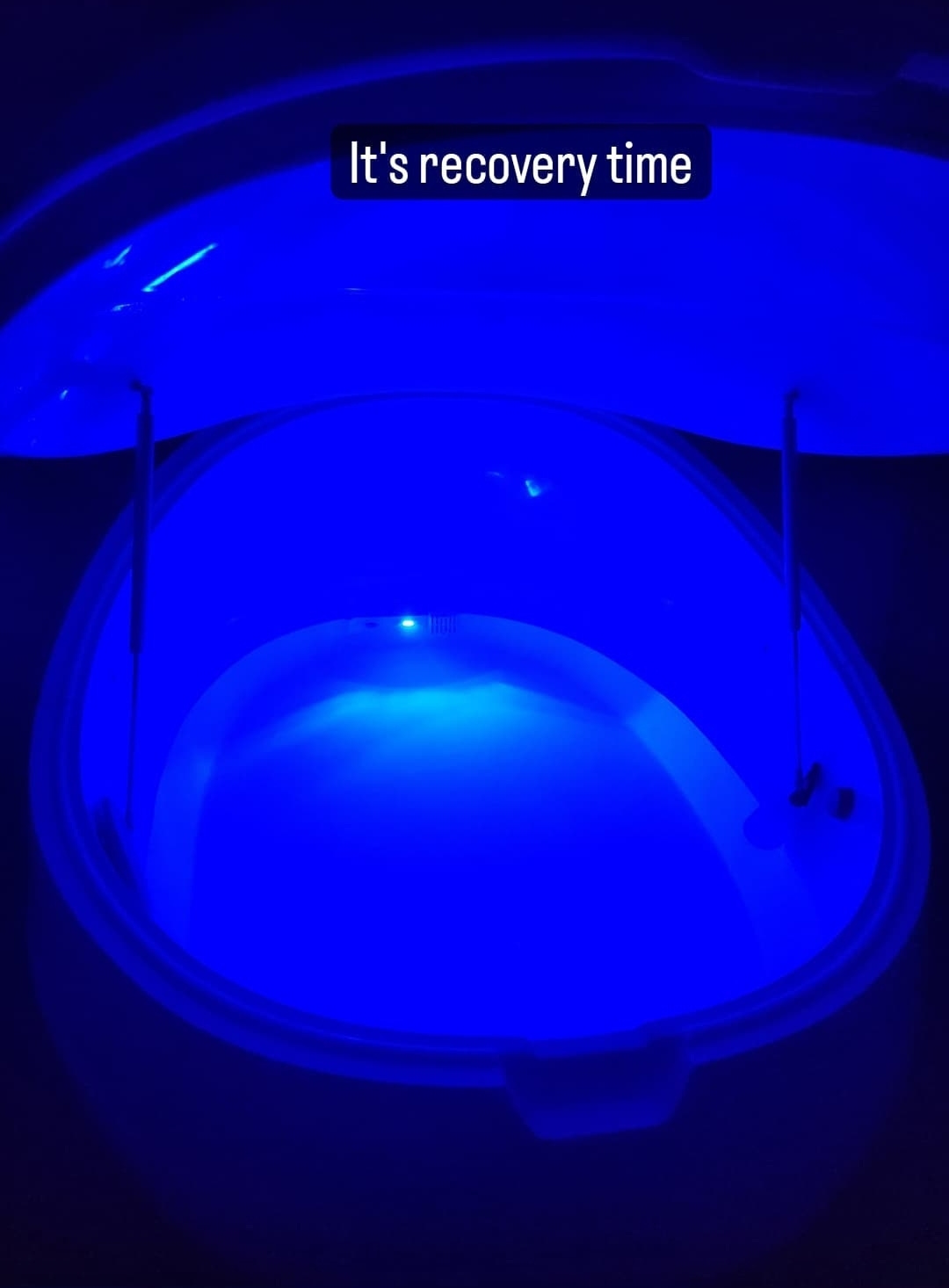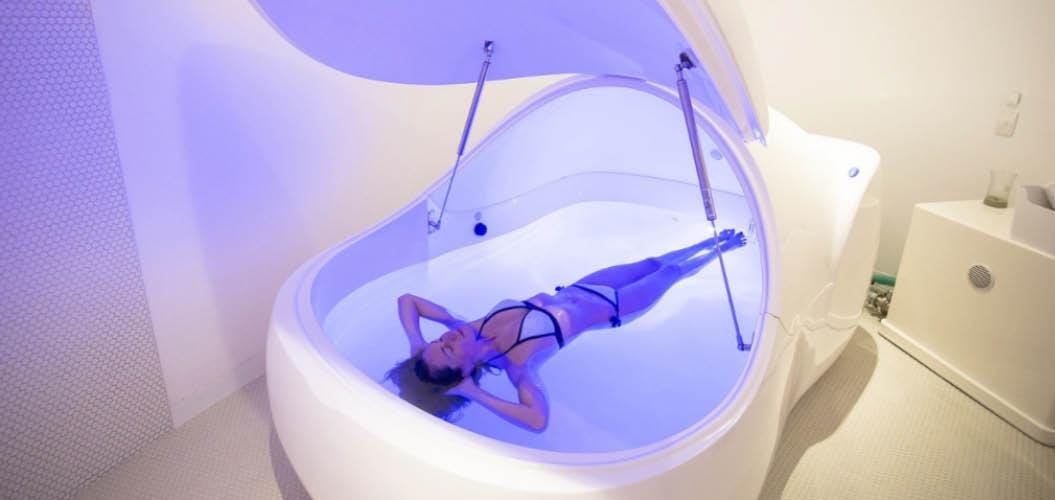The first time I floated in a sensory deprivation tank I had a distinct visual hallucination. I saw a soft green glowing orb forming in the middle of my vision. I can’t remember if my eyes were open or closed - it didn’t matter, it was pitch black either way. This translucent orb swirled in, taking its form from all sides. When the orb finally came to rest, it transformed into a silhouette of an owl perched on a branch, glowing the same diffused green colour. “Holy shit”, I whispered to myself, trying not to break the spell. The owl suddenly lowered itself in my visual field and morphed into a duck sitting on water. The duck then slowly floated out of my vision and never returned.
I’ve been a regular floater since then.
We are living in a world of overstimulation. It’s impossible to get away from it all, to get fully away from it. You may be able to go for a nice walk or relax on a couch, but this still leaves you with sensory input from the world. When was the last time you were alone with your mind? Never. There’s always been some physical sensation that takes your focus away from your mind. Well, floating deprives you of the physical world. You get a complete experience alone with yourself. An experience you never otherwise have. Some may be frightened of this proposition, but at any time you are able to sit up and end the experience if you ever get too uncomfortable. However, maybe those discomforting thoughts are exactly what you need.
So what is it?
Isolation tanks, float pods, or sensory deprivation tanks, are pods filled with shin-height, warm water. They’re filled with Epsom salt which forces you to float. The experience is designed to shut off all external sensory input, forcing your attention inward.
Let’s see how it does this:
Sound - Earplugs are used to stop sound from the outside world from getting in.
Sight - Once inside the pod, the outside lights turn off. There is no difference in your visual field if you close your eyes or keep them open.
Touch - The temperature of the water is the same as the air, which is the same temperature as your skin. Once you stabilise yourself you no longer feel the water against your skin and you have the sensation of total weightlessness.
At this point, your mind has no external sensory stimulus. So what happens to you?
The Physical
Total physical relaxation. There is no other time in your life that your body is completely floating in space (unless you’re an astronaut). It requires no effort in keeping yourself afloat and you are effectively in a zero-gravity situation. Your body has to go into full relaxation mode.
Floating has been shown to improve the quality of sleep, drop your levels of stress and anxiety, and assist with sports recovery and pain relief. You can read more about the physical benefits here.
Lastly, there’s the extreme sensation of overwhelming bliss that one can feel, it’s like a full-body orgasm. I’ve had waves of ecstasy pulsing through my body. It is the most all-encompassing, euphoric feeling I’ve ever had.
Have you ever experienced that warm feeling of goosebumps going down your arms? Some people ascribe this to a spiritual experience and I definitely had it when I was a Christian at some worship services. However, I’ve also experienced it while meditating, on drugs, listening to music, having a good conversation, and working out… but the most powerful experience I’ve had of this, by far, is when I was in the float tank. You take the feeling when you hear the chorus of your favourite song and the goosebumps start to go down your neck and arms, and you multiply that feeling by 50 times. That is how strong it is. It lasts for maybe 15 - 20 seconds, but wow.
If these many positive, physical side effects are not enough to sell you, let us now switch our attention to the mental side of things. Specifically, what it’s like to be your mind while you’re deprived of all physical sensation.
The Mental
Floating is meditating on steroids.
Usually when we’re out in the world different senses are vying for our attention. A car will zoom past, birds will start chirping, or maybe the sun will break through the clouds and warm up your skin, all of these things can capture the spotlight of attention, if only for a moment. When we are not consciously reacting to the physical world, we are usually lost in thought. Even when we are doing an activity, our thoughts can hijack and possess our minds. We are constantly thinking without realising we are thinking.
Floating gives you an insight into how busy your mind is. Since you have shut down all avenues of sensory input you’re forced to do nothing but be alone with your thoughts. Your mind is firing on all cylinders. You may choose to get completely lost in your thoughts and let them come and go as they please, or maybe your mind will decide it’s time to face off with something uncomfortable in your life.
Sound scary? Maybe. But your mind should not be a place to be scared of. It’s the place of ultimate wonder, creativity and beauty.
Whatever happens, you’ll come to realise you do not have control over the types of thoughts that arise. Try to pause your thoughts while floating, and within seconds a tidal wave of them will come back to drown your mind.
If you find this interesting, read one of my top posts about the undue suffering we inflict upon ourselves.
This, in my opinion, is the perfect time to practice mindfulness.
It’s not about stopping thoughts from occurring - as this is out of your control. It’s the practice of resetting every time you realise you’re lost in thought. Your mind is always wanting to latch onto a thought or a physical sensation. However, you have a choice at every moment to let go of that thought, on the condition you realise you’re thinking at that moment. Recognise the thought, then let it go.
You can use this to relinquish unnecessary anger, embarrassing memories, or anxiety about the future. Mindfulness helps you realise when you’re stuck in one of these negative thought loops and gives you the ability to move on and live more in the moment.
This is a powerful tool to have in your arsenal. It’s not easy, it’s why it takes practice.
So when I go for a float, I go in to practice mindfulness. Just like with the gym I use to strengthen my body, I use this opportunity to strengthen my mind. To develop a skill I use in everyday life.
People say time is the most precious resource, but it’s not. It’s attention. You can have all the time in the world, but if you’re constantly distracted then time becomes wasted. Mindfulness helps direct your attention to what matters most. What’s the point of time, if you can’t give your attention to what’s important at that time?





